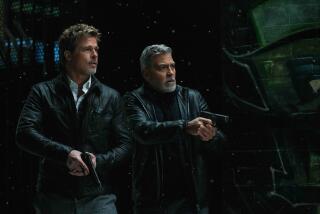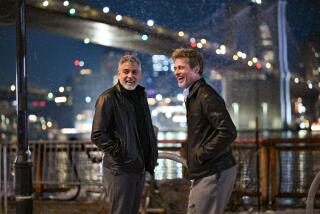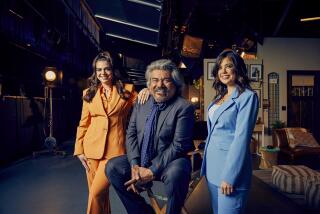Catching Up With the Clooneys
- Share via
American Movie Classics scored a coup for Father’s Day: recruiting Nick Clooney and his son, George Clooney of NBC’s hit drama “ER,” to host a marathon of James Stewart films.
Together, they would share personal anecdotes, talk about their love of movies and catch up on each other’s careers. It was to be a heartwarming father-son reunion. Until they started tossing around a baseball.
“He darn near cost us $8,000,” George recalls of his father’s pitch. “He does a full windup and hits the [camera] lens.”
“Wait a minute George, it was your idea,” Nick says. “You said, ‘Why don’t you throw at the lens?’ ”
“Geronimo couldn’t have caught this ball,” George says.
They go on and on about this game of catch, even in an interview several weeks after they taped the segments at the Beverly Hills home of Rosemary Clooney, George’s aunt and Nick’s sister.
Baseball aside, the Clooneys are a tandem of quick wit, musical might (they do a duet of “Off to See the Wizard”) and a self-deprecating approach to fame: You can be wildly popular one day, off the air the next.
“I’m so aware that I am 10 seconds away from Larry Storch,” George says, his father chuckling in the background. “That’s the way it happens. And he’s one of the most talented people in the world. . . The point is, there’s no rhyme or reason for it happening.”
Given George Clooney’s new stardom as Dr. Doug Ross on “ER” and Nick Clooney’s new recognition as the daytime host of AMC, it hasn’t been often that father and son have gotten together. So just what do they talk about in these AMC segments?
“Well, my father has a drinking problem, and it’s kind of an intervention,” George says.
“I never drank until George was born,” Nick says.
“The thing about it is, I didn’t know he was my father until I was 20,” his son shoots back.
Says Rosemary Clooney about these two: “They have exactly the same sense of humor. I don’t know how to describe it. ... It can be absolutely annoying at times. But you just go along with it if you are in the mood or if you’re not, you shut the door to your bedroom.”
It’s not hard to see why they have similar personas. George grew up witnessing his father’s career. As a broadcaster in and around Ohio, the elder Clooney often switched jobs or traveled on temporary assignments, but George, wife Nina and daughter Ada always went with him. At one time, the family lived in a trailer, a temporary home while Nick tried a brief stint in dinner theater.
“Life at our house was a lot different than many others because Pop had a different job every year, or every week,” George says. “ ... We’d live in a mansion, then a very modest house. We always had a fairly comfortable life, but there was nothing guaranteed.”
Nick quips: “I left them in every mall in the Midwest, but somehow they kept finding their way back.”
The moves could be disruptive, but George says he learned that his Dad “always stood up for what he believed in. He lost a lot of jobs for that.”
One such loss came in the late 1960s, when Nick got a big break as the host of a daily talk-variety show in Columbus, Ohio. But the job came to an end after he made some controversial statements about gun control.
“The day after the assassination [of Robert Kennedy], Georgie came up to me with five toy guns and said, ‘I don’t want these anymore, Pop,’ ” Nick recalls. “I said what he said on the air, and it was enormously effective with our audience.”
It wasn’t a popular stand with advertisers, given that Columbus was then the national headquarters of the National Rifle Assn. Six months later, the Clooney show didn’t get renewed.
The show had its faults, Nick says, “but the position I was willing to take on the indiscriminate use of firearms certainly didn’t help.”
Nick moved on to Cincinnati, where he achieved much greater popularity as a TV host and newscaster. He and Nina still live in the family’s Victorian house in neighboring Augusta, Ky., and Clooney is well-recognized as a local broadcast celebrity.
“You have to understand that in this one world, pop’s Johnny Carson,” George says. “He’s a huge, huge star. Everywhere I went, we were the most famous family around. We were always in front of people.”
At one point, in 1974, Nick hosted a morning radio program, a noontime variety show and the matinee movie. At night, he performed in a dinner theater version of “The Odd Couple” with another news broadcaster, Gene Randall (now on CNN) and on weekends flew to New York to tape the ABC game show “The Money Maze.”
“It was a full family operation,” Nick says. “I was like Dagwood Bumstead. The kids had all the clothes set out for me to jump into.”
The kids also got into Dad’s act. In his teens, George worked on “The Nick Clooney Show” as a stagehand, floor director or cue-card holder, not to mention appearances in comedy or musical skits. Among them: He and sister Ada performing The Carpenters song “Close to You.”
“That was embarrassing,” George says now.
“It was cute,” Nick insists.
Even so, George was taken by his TV gigs and studied broadcasting at Northern Kentucky University. He had modest success working at local stations, but found it tough to escape the shadow of his father’s career.
“There are things that get you your foot in the door, I admit that, but then you are compared to your father, who is much more talented than you,” George says.
He found a new career when cousin Miguel and his father Jose Ferrer (Rosemary’s ex-husband) came to nearby Lexington to shoot a movie, “And They’re Off.” George snared a part.
“The movie was so bad it never came out,” George says. But he was set on acting. He saved $300 from a job cutting tobacco, and then broke the news to his dad: He was headed for California.
“I told him it was the dumbest thing I ever heard of,” Nick says. “I went on and on that, ‘You’ll be parking cars and waiting tables and you still have to graduate from school and it’s ridiculous.’ But he said, ‘Pop, this is what I want to do.’ ”
George went cross-country in a beat-up Monte Carlo, which he dubs the “The Danger Car” because it couldn’t go above 50 mph. He made it, and landed at Aunt Rosemary’s house, where he lived for a year with several of her other children.
“Nicky was worried about Georgie putting himself on the line for rejection,” Rosemary Clooney says. “There can be some very hurtful situations.”
His famous aunt, who would know of what she spoke, didn’t try to give her nephew advice.
“I didn’t tell [George] anything,” she says. “Every experience is different, and I don’t think he had any preconceived notions.”
George still jokes about some of his early movies, such as “Red Surf” and “Grizzly 2,” which was shot in Budapest even though it was set in Southern California. “If it doesn’t have a ‘Return’ in front of it, I didn’t do it.”
He remembers getting a job on a pilot for a CBS Western. After the table reading, a CBS executive gushed, “You’re lightning in a bottle.” A week later, the network had changed its mind about the show: They fired all the cast members except Clooney. And the executive told him, “I’ve called in an acting coach for you.”
“If I had believed the first [meeting], the second one would have been devastating,” Geroge says. “You have to be self-sufficient. It’s how you deal with it and how it gets to you.”
Nick, however, was in for a surprise when he got his first glimpse of his son at work. As a Mother’s Day gift, he took Nina to see George perform at a Santa Monica theater. The theater was a converted gas station, and the play was about Sid Vicious and the Sex Pistols.
“George played a druggie, a street whore and a murderer--and he was the comic relief,” says Nick, who had moved to Los Angeles to anchor the KNBC newscast. “It was just the most oppressive play. I was having a heart attack.”
In fact, he couldn’t breathe, and went outside to take a walk around the block. “I then finally realized that I was going to be watching my son, and he was going to be doing something that I couldn’t do anything about.”
He went back inside and watched--and even grew to like his son’s performance. “It was great,” Nick says. “I was pinned to the back of my chair, for a lot of reasons, like there was something sticky on the seat. But it was the first time I knew he was really good at this.”
After that experience, and many other roles to follow, the father no longer finds it shocking to watch his son. That includes “ER’s” smooth-talking, womanizing Doug.
“I will watch and think, what a jerk that guy is and say, ‘Wait a minute, that’s my son.’ He does this stuff really well. It’s not him, but he’s very funny.”
At this point, the mutual admiration ends when the conversation turns back to that ill-fated game of catch. Miraculously, the camera lens didn’t break because it was guarded by a light filter. So their interplay will all be caught on video.
“We’ll see that rag arm of yours,” George says.
“It’s a great arm, a great arm,” Nick says.
“Oh yeah,” George says.
“You see. Everything else, he’s OK with,” Nick interjects. “But baseball, he can’t handle it.”
“Oh yeah, right.”
“Can’t handle it, can’t handle it.”
More to Read
The complete guide to home viewing
Get Screen Gab for everything about the TV shows and streaming movies everyone’s talking about.
You may occasionally receive promotional content from the Los Angeles Times.






